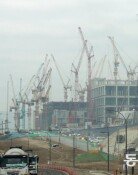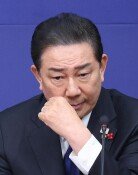How Will the Real Estate Tax System Change?
How Will the Real Estate Tax System Change?
Posted July. 30, 2005 03:06,
The Uri Party, Grand National Party (GNP), and Democratic Labor Party (DLP) are clashing sharply over the governments real estate policies.
At the July 29 forum New Directions for the Real Estate Tax System hosted by the DLP, real estate experts from the three parties, along with members of the Ministry of Finance and Economy and various civic groups, held a heated debate on the abolition of the transfer income tax exemption for households owning a single residence, the development profit redemption system, and the revival of the concept of public land ownership.
The DLP and civic group representatives argued that holding and transfer taxes should be greatly increased, and the public land ownership concept reintroduced. By contrast, the Uri Party and the government, while emphasizing the principle of hard on holding tax, lenient on turnover tax, remained reluctant on the issue of public land ownership. Meanwhile, the GNP agreed on strengthening the holding tax system but objected to a precipitate increase in tax burden.
Government Objects to Abolishing Transfer Tax Exemption for Single Households Owning Only One Residence-
DLP assemblyman Shim Sang-jeong stressed in his presentation that only one percent of all property transfers that took place between 2000 and 2003 involved a profit margin exceeding 200 million won, asserting that the transfer tax exemption for single-residence households should be abolished in favor of an income tax deduction system up to a profit margin of 200 million won.
However, Uri Party real estate policy specialist Ahn Byong-yub objected to this proposal, saying, Discontinuing the tax exemption system will incur strong resistance from the public since real transaction price-based market practices have yet to become the norm. He stated, At this juncture, we will focus on establishing the larger principle of taxation based on real transaction prices.
Controversy Over Sudden Tax Burden Increases-
Although the GNP supported the reinforcement of holding taxes as a deterrent to speculation, it insisted that the turnover tax be dramatically lowered to relieve the peoples burden.
The GNPs Kim Jeong-bu, who heads the Special Committee on Tax Reform, pointed out, The governments plan specifies the goals and timeframe of the proposed holding tax reform, but contains no mention of when and how far the turnover tax is to be lowered.
President Kim Chung-ho of the Center for Free Enterprise (CFE) said, If real estate tax revenue is to be increased without a public consensus on increasing the taxation rate, it is only right that we decrease the burden in other taxation areas. He emphasized, To compensate for raising the holding tax rate, taxes on acquisition, registration, and property transfers should be lowered.
Conflict of Opinion Over Concept of Public Land Ownership-
Jun Gang-soo, a professor at the Catholic University of Daegu and chairman of the Land & Housing Committee under the Citizens Coalition for Economic Justice, said, Theres a limit to the level of real estate price stability one can achieve through tax reform. A possible alternative is the adoption of a market-friendly concept of public land ownership.
However, Ahn Byong-yub responded negatively to this idea, insisting that the redemption of development-related profits will be consolidated into the infrastructure charge system.
Kim Jeong-bu voiced a similar view, saying, Rather than introduce a potentially unconstitutional public land ownership concept, we should create an outlet for floating capital.
Chi-Young Shin higgledy@donga.com







